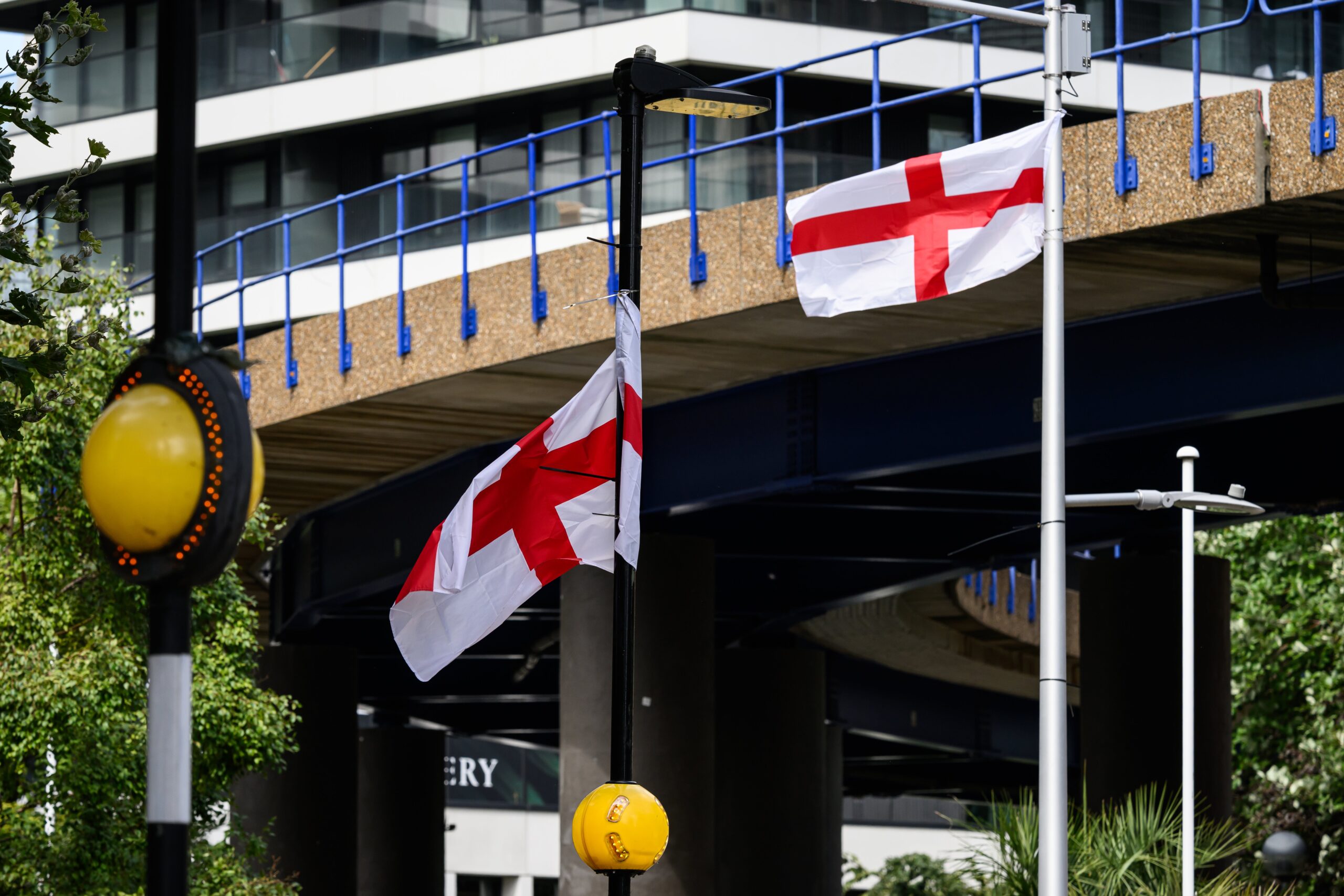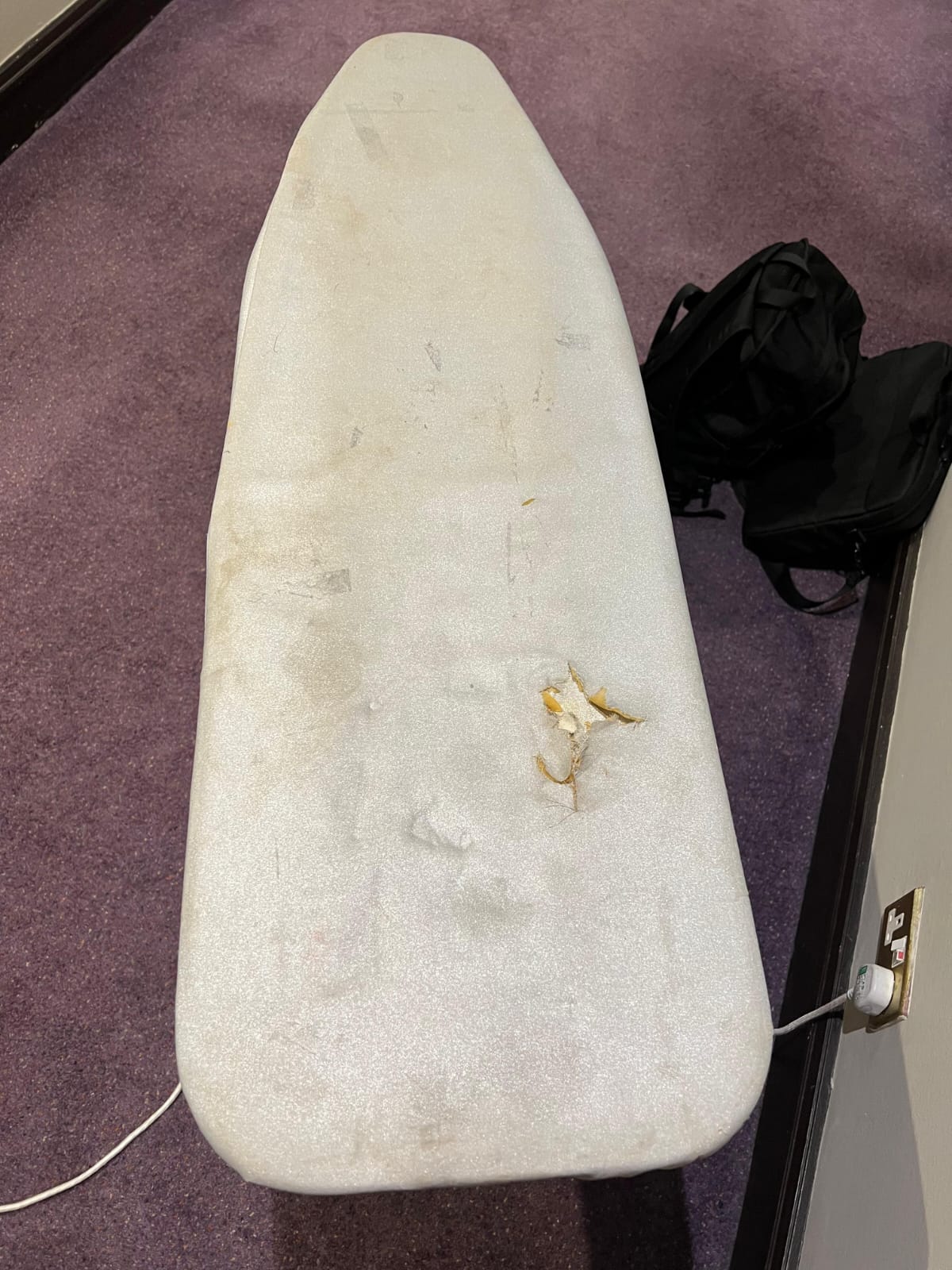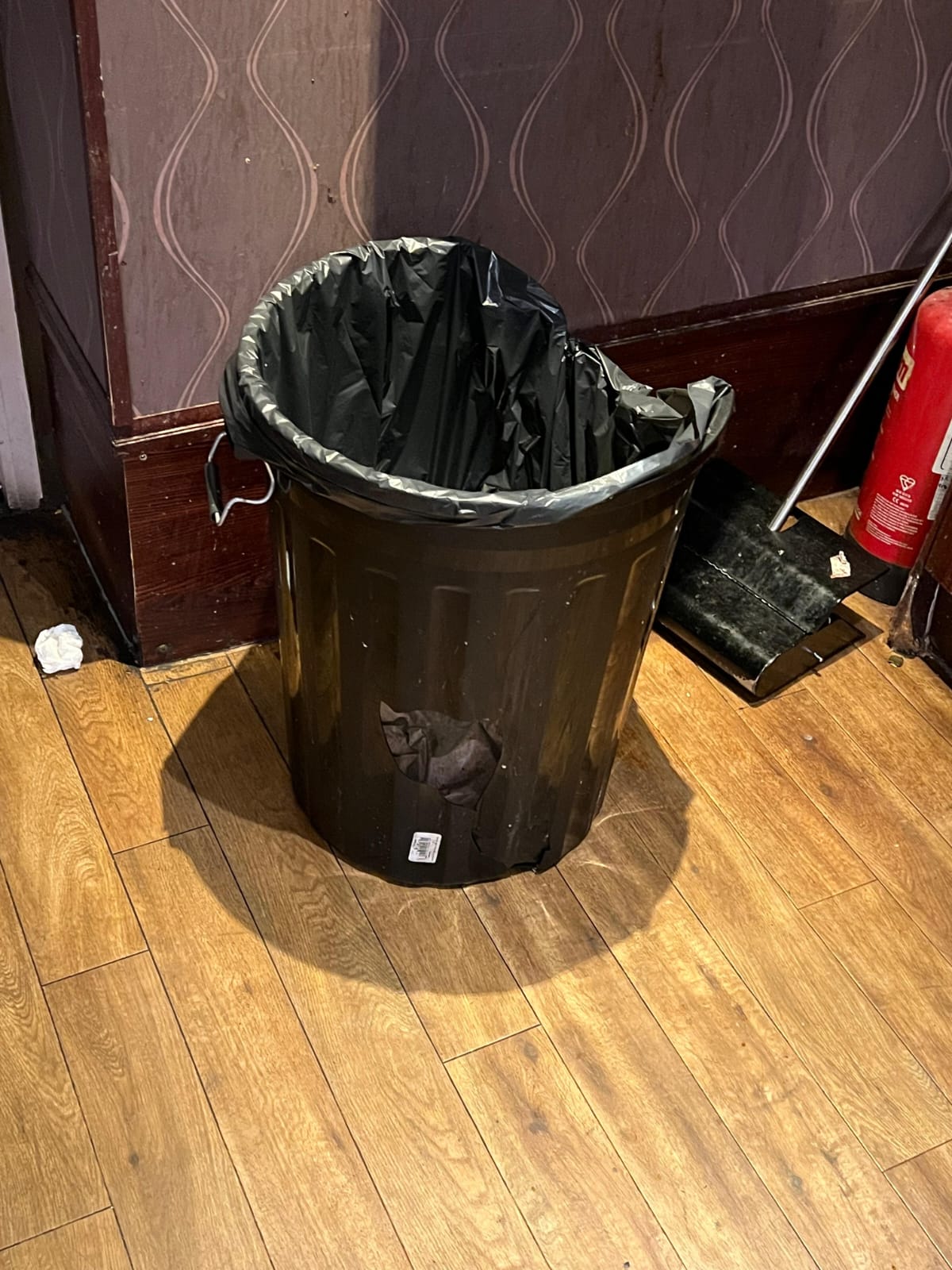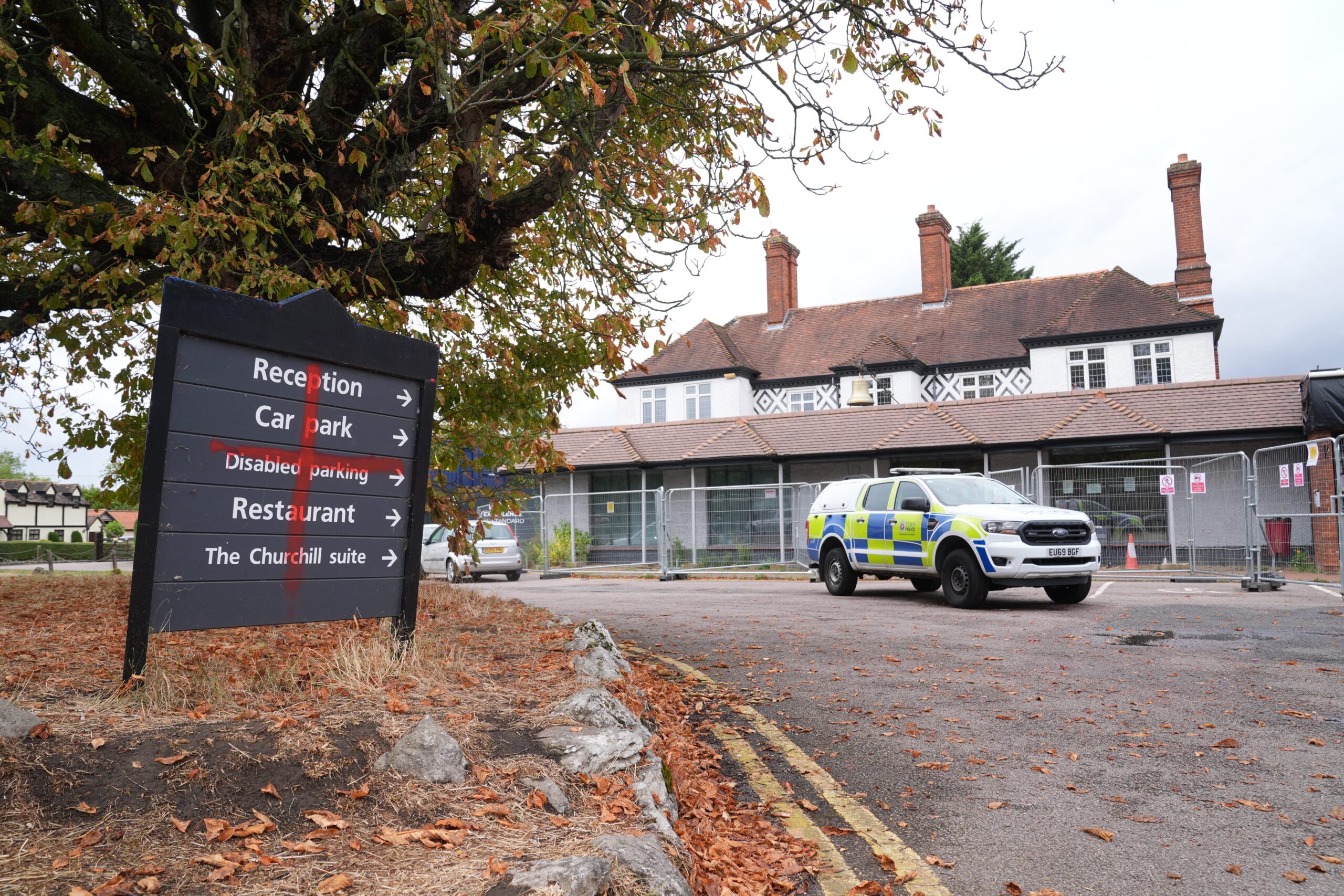Lost and helpless in a foreign country, Abu Omar* was grateful to be given a place to stay in a hotel after arriving in the UK last year.
After fleeing a refugee camp in Jordan, he and his young family were offered a room in a London hotel, which had been designated for asylum seekers by the goverment.
Abu and his wife Sarah* live there with their two young children, packed together into a tired and bleak single room. Living day to day inside the four walls, they survive on a diet of bread, cheese and fruit. They said they decided to stop eating the hotel food after their children, a daughter aged 4 and a son aged 6, both contracted food poisoning from uncooked chicken served there.
Abu had little with him when he arrived in Britain and, after his pair of trousers got torn, he was left with only one outfit – the tracksuit he had arrived in.
Once a week, Sarah would hand-wash his tracksuit in the sink of their hotel room. With nothing else to wear, he would remain there for a day or two in his underwear until his clothes had dried.

Abu’s basic existence is a far cry from the life of “luxury” for migrants that the government described this week as ministers dicussed a plan to move migrants to military barracks. Instead, campaigners say migrants can be squeezed 11 to a room, in rooms devoid of even the most basic of facilities and food so bad it has been seen to cause diabetes.
‘They were cleaning the bathroom with the pillow case we slept on’
Wiping the tears from her eyes, Sarah, 26, told The Independent that their living conditions inside the hotel made her feel “disgusted”. “I witnessed the hotel staff cleaning the toilet and windows with the pillow cases we slept on,” she said. Although the cleaners brought fresh pillow cases for the family, Sarah said she was unable to sleep, knowing the bed linen could have been used to clean toilets.
Abu and Sarah are telling their stories as the prime minister comes under renewed pressure over the government’s use of hotels after a bombshell report found the Home Office was squandering billions of pounds on the accommodation due to incompentence.
Since the pandemic, hotels have been predominantly used to house asylum seekers, with latest figures showing around 32,000 are being housed in this type of accommodation.
The Labour government has vowed to end use of asylum hotels by 2029, but now wants to speed this up after a wave of anti-migrant protests during the summer, some of which led to violent disorder. Some protesters appeared outraged at the idea of asylum seekers taking up spaces in “luxury” hotels.
Yet campaigners, and those living inside the hotels, say this perception is totally wrong. Refugee Action insists this accommodation is “hotels in name only” and lack “everything that makes a hotel a comfortable or desirable place” to be.
Steve Smith, CEO of Care4Calais, added: “Nothing screams ‘luxury’ like overcrowded rooms, inadequate food, filthy conditions, stained mattresses, leaking plumbing, damp, and infestations of rodents and bugs.
“It’s clear that the people who create policy are detached from reality. These are not ‘luxury’ hotels. These are former hotels that are now being milked for private profit.”
‘I stayed in my room for a whole week out of fear’
Khalla Mohamed*, 39, who fled Iraq to escape militias who put threats on her and her family’s lives, lives in a Home Office hotel in south London.

Working as a school librarian, she left behind her family, her home and her job to seek safety in the UK. She told The Independent that her life away from her family is hard. “I have anxiety, depression and nightmares. I can’t sleep at night thinking about my family and my husband. If they find him they will kill him”.
She now lives on a basement level of a hotel where there is mould on the ceiling, bathroom and behind her bed, which she says makes her “sick and unable to breathe”.
Her mattress is also “very old, smelly and turning yellow”. In a bid to make it more comfortable, she covers the mattress with three or four layers – “and it still smells bad”.
As a woman living alone, she feels unsafe in the hotel. As expected from a hotel housing some people who have suffered high levels of trauma, there are people with mental health issues, as well as regular incidents involving aggressions and fighting – with one woman throwing even around hot water during an outburst.
Ms Mohamed says she can “feel every movement” of the neighbouring rooms, including slamming doors and loud noises in the early hours of the morning.
There are no basic essentials like shampoo or hand wash – meaning she spends some of her £8 a week government allowance on it.
Once, Ms Mohamed says, she found a slug in the bathroom on the toilet seat and shower and complained to the reception: “They told me it was okay because it is not harmful,” she said, adding that she was given the impression by hotel staff that “this is a free hotel so you should accept any circumstance you are in”.

The kettles and ironing board have been removed from the rooms and hotel staff regularly search rooms and belongings in case the residents are breaking the rules, such as a ban on cooking, she said.
Ms Mohamed said the hotel security warned them recently that three “dangerous” strangers had entered the hotel and that they shouldn’t open their room doors to them. In fear of her safety, she stayed in her room for a whole week.
‘The hotel room was full of mice’
Laila Sharif’s*, 22, said her life was threatened in Jordan because she married her husband against her family’s wishes. She applied for asylum in the UK for a “better and safer” life for her children.
Now in the UK, she is squeezed into one room of an asylum hotel with her husband and children. “I lived through the worst days in the hotel and I was begging them to move me. My husband and I had a psychological breakdown in the room, and my child didn’t have enough space to play in the room. There wasn’t a closet for my child’s and our clothes.”
They also suffered from a rodent infestation. “The hotel was full of mice, even in my room,” she said. “I was completely and psychologically devastated, especially as I was pregnant. When we complained the hotel staff begged us not to complain and that they would do something about it,” she said.

The hotel staff did deal with the mice problem eventually, but she said it was a stressful time for her family.
Reflecting on the protests, she said: “I heard the protesters were saying that we the asylum seekers were living better that them and that we were enjoying the happy life. But they don’t know the reality of an asylum seeker.”
‘I share my room with a total stranger’
Rami Khalil* was forced to flee Kurdistan as a student after a government crackdown on protests made it too dangerous for him to stay. After experiencing widespread poverty and starvation, he covertly came to Britain in 2007 in a lorry.
Now, far from living in luxury, he is financially struggling, isolated and unable to plan for the future.
Rami, 29, described how life in the hotel in the north of England feels “lonely, unsafe and without privacy”. He shares a small room and bathroom with a total stranger, who speaks a different language to him.
The conditions are dirty, crowded and he has nowhere to take confidential phone calls, leading him to feel constantly on edge, he said. Pictures from inside his hotel show a ripped and unsanitary ironing board and a broken bin.

Rami said he has now been locked in the asylum system for years – likening the hotel to “prison” – and is still awaiting a government decision. He described how he struggled to find “a space to call home” after being moved from a government-sanctioned hostel to various hotels over the years.
In his latest accommodation, Rami has witnessed weekly protests: “I see protesters standing outside and shouting, swearing sometimes with kids alongside them, and it is really scary.
“I don’t understand why they believe the lies about us, instead of seeing the reality of our lives. We are here to seek safety, rebuild our lives that we couldn’t continue in our country.”
Through all the trials and tribulations, Rami’s story is a powerful one of resilience. He uses his time to volunteer extensively for charity – helping others with translation, casework, language teaching and more.
He hopes to work in the UK eventually, using his skills to give back to society, and pay taxes in the future if he is given the legal opportunity to work.

Nazek Ramadan, director at charity Migrant Voice, said: “These are not ‘five-star’ hotels. We have witnessed people being forced 11 to a room, sharing bathrooms and toilets across floors among 30 or more people.
“Rooms devoid of even the most basic of facilities, right down to kettles, and food so bad it has been seen to cause diabetes. Nobody comes to this country having fled war and persecution and chooses to be placed in these conditions.”
A Home Office spokesperson told The Independent it “did not recognise the claims being made”.
“Where concerns are raised about any aspect of the service delivered in a hotel, we work with the provider to ensure these concerns are swiftly addressed,” they said.
“This government has taken urgent action to fix the asylum system by doubling the rate of asylum decision-making this year, reducing spending on hotels by over half a billion pounds and committing to closing every hotel by the end of this Parliament.”
They said none of the claims had been reported to them or their providers, but that any allegations would be investigated. They claim to conduct assurance inspections of initial accommodation properties at least every six months.
‘We are not here to fight’
Abu and Sarah’s journey to this country began with a love story. They met in Jordan where Abu, 40, was born in a refugee camp. Originally from Palestinian heritage, his parents were displaced from Gaza in 1948.
He fell in love with Sarah, who is of Jordanian heritage, but their families did not approve of the relationship. After getting married, they fled, along with their two kids, searching for a new life outside of a refugee camp.

As a United Nations-recognised Palestinian, Abu secured a tourist visa and flew by plane to the UK in 2024. He described experiencing a “whirlwind” of emotions when he first arrived, completely homeless. “In the beginning, I was near a mental breakdown because I didn’t know what to do. I didn’t know the language. I was nervous and anxious for my family,” speaking in Arabic to a translator he told The Independent:
Having fled halfway around the world to escape harrassment for being Palestinian, Abu’s experience in the UK is one of being sworn at, verbally abused and scared for his safety as protests raged outside his accommodation.
Still, he is happier to be in a safer country away from threats to his life and no longer homeless out in the cold, while he waits for a verdict from the Home Office on whether he can stay.
He added: “We are only peaceful people who come to seek refuge in this country. We are not here to fight or do anything bad. We want to get help and help others.”
*All names featured in this article are pseudonyms which have been given to protect the identity and safeguarding of the asylum seekers featured in this story.
